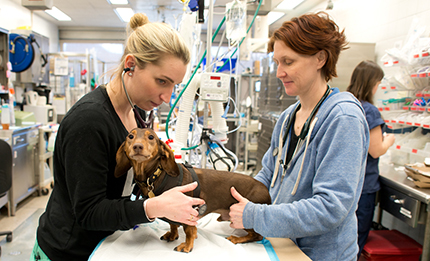Why Would I Want to Take My Pet to a Veterinary Teaching Hospital? 7 AMC Myths Dispelled
Why Would I Want to Take My Pet to a Veterinary Teaching Hospital? 7 AMC Myths Dispelled
 Pet families have many choices when it comes to pet healthcare providers. In New York City, the neighborhood veterinarian is convenient for routine care, but emergency and specialty care may require travel. In addition to the inconvenience of travel, pet families may be apprehensive about coming to a large, teaching hospital like AMC, where, in addition to the inconvenience of travel, they perceive students will “practice” on their pets. Here are some common myths about veterinary care at a teaching hospital.
Pet families have many choices when it comes to pet healthcare providers. In New York City, the neighborhood veterinarian is convenient for routine care, but emergency and specialty care may require travel. In addition to the inconvenience of travel, pet families may be apprehensive about coming to a large, teaching hospital like AMC, where, in addition to the inconvenience of travel, they perceive students will “practice” on their pets. Here are some common myths about veterinary care at a teaching hospital.
Myth #1: It’s not a big deal that we have AMC here in NYC. Aren’t veterinary teaching hospitals everywhere?
While many veterinary specialty hospitals have interns, those that sponsor training programs to train specialists and have education as a component of their mission like AMC are not so common. Veterinary teaching hospitals at colleges of veterinary medicine offer residencies to train specialists, but there are only 30 colleges of veterinary medicine in the United States. Some other large hospitals, similar to AMC, are well known for their residency training programs, but overall, less than 20% of residency training programs occur outside colleges of veterinary medicine.
Myth #2: AMC is “rich;” it has a lot of money, more than a regular hospital.
When it comes to money, AMC provides different types of services resulting in higher expenses and increased overhead compared to a neighborhood veterinary clinic.
Unlike most other hospitals, AMC, as part of our non-profit mission:
- Provides low/no cost treatment for guide dogs, rescue animals needing specialty care, military dogs, pets of senior citizens, and other qualified individuals.
- Operates 24/7, compared to the daytime schedule most neighborhood clinics use.
- Incurs the cost of training residents and interns.
- Conducts research to help improve veterinary care.
Myth #3: If I go to a teaching hospital, doctors and students will experiment on my pet for training purposes.
AMC does not induce disease for research and does not maintain any laboratory animals for research. We study naturally occurring disease in our patients and offer opportunities for pets to participate in clinical trials. Participation is strictly voluntary and requires the family’s permission.
Who will you meet at AMC?
- Staff Doctor: Part of the permanent faculty, has completed all training, and may be a board certified specialist.
- Resident: Has graduated from veterinary school, is licensed, and is completing training (residency) to become a board certified specialist.
- Intern: Has graduated from veterinary school, is licensed, and is spending 12 months rotating throughout the hospital to gain valuable experience. About half the AMC interns go on to residency training.
- Veterinary Student: Not yet graduated from veterinary school, these visiting students are observing at AMC, many in hopes of securing an internship.
Myth #4: Getting taken care of by residents and interns means I’ll get sub-par treatment.
AMC staff doctors believe that working with interns and residents holds them to a higher standard of performance. Interns and residents constantly ask questions and the staff must be up on the latest tests and treatments to stay one step of head of them. Yes, they do learn on the job, but only with staff doctor oversight. I guarantee you will be happier with the next generation of veterinarians who have had the opportunity to pursue post-graduate training than a generation without hands on experience.
Myth #5: A doctor who is also a teacher has less time for me, the client.
Teaching takes the time of the staff doctor, not the client. Staff doctors discuss cases before and after clinic time. Training interns and residents actually translates into more time for the pet and their family since they can return phone calls, answer emails, and refill prescriptions more quickly than a solo practitioner can. Hearing medical information from a variety of healthcare team members helps to increase understanding and thus client satisfaction.
Myth #6: Why should I care whether or not AMC conducts research?
Here are three reasons to care:
- Research helps the doctors and staff to be better educated about newly available treatments for your pet’s condition.
- Your pet could be in a study that benefits his health and contributes to the discovery of a cure.
- Knowing your hospital is trying to improve the health of our country is a very positive thing. AMC cares about all animals, not just those we take care of on 62nd Street.
Myth #7: No one chooses an AMC over a community hospital for standard care.
On the contrary, many patients prefer AMC for primary and standard care, knowing that their pet has a primary care veterinarian who can reach out to any of our board certified specialists when the need arises.

































